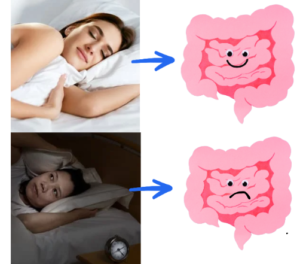Exploring the Essential Connection Between Optimal Sleep Quality and Digestive Health
Sleep serves as a fundamental physiological necessity, far beyond just a time for relaxation; it critically influences our digestion. The intricate relationship between sleep and digestive wellness involves a spectrum of biological functions that work in harmony. Central to this relationship is the body’s circadian rhythm, often referred to as the internal biological clock, which regulates both sleep patterns and digestive processes. This synchrony explains why many people experience sensations of hunger at predictable times daily, revealing how our bodies attune themselves to natural biological rhythms.
Recognizing the Critical Role of Quality Sleep in Promoting Digestive Function 
Sleep is absolutely essential for the body’s capacity to heal, rejuvenate, and restore its various systems. Among these systems, the deeper phases of sleep stand out as particularly vital for these restorative functions. During these profound stages, the organs, tissues, and cells that form the digestive system not only experience relaxation but also actively engage in critical repair processes. Notably, the body prioritizes cellular repair and growth during deep sleep, especially focusing on regenerating the cells lining the digestive tract, which face constant wear and tear from food particles and digestive enzymes. This regeneration is crucial for sustaining the integrity of the gastrointestinal lining, thereby enhancing the efficacy of digestion.
Deep sleep is integral to fortifying the immune system, especially within the digestive system, which harbors its unique immune cells activated by beneficial gut bacteria. These immune cells are indispensable for safeguarding the gut and the overall digestive system against harmful microorganisms, ensuring a balanced bacterial population in the gut ecosystem. This balance is fundamental for maintaining good health and preventing digestive disorders.
Moreover, the organs within the digestive system play a significant role in detoxification processes, which are essential for eliminating waste and harmful substances from the body. Deep sleep enhances this detoxification process by improving the functional efficiency of the liver and kidneys, enabling these vital organs to operate at peak performance. This synergistic relationship between sleep and detoxification is pivotal in fostering overall digestive health and well-being, thereby underscoring the importance of prioritizing quality sleep for optimal health.
Analyzing the Connection Between Gut Motility and Sleep Patterns
A fundamental component of digestion is the effective movement of food and waste throughout the digestive tract, a process known as gut motility. This essential process experiences notable changes during sleep. Throughout both deep and light sleep, the rate of gut motility significantly decreases. This reduction serves as a necessary adaptation, allowing the digestive system to conserve energy, which is then redirected towards repairing digestive tissues. Such energy conservation is crucial, enabling the digestive process to function more efficiently during waking hours, optimizing both nutrient absorption and waste elimination.
The migrating motor complex represents a cycle of contractions that occurs during fasting intervals, including during sleep. This cycle is vital for ensuring proper gut motility, as it effectively sweeps away food particles and residual waste that may linger in the digestive system. This natural cleansing mechanism minimizes the risks of bacterial overgrowth, promoting a healthy gut environment. Notably, the migrating motor complex is most active during nighttime when individuals are fasting and asleep, highlighting the indispensable role of sleep in safeguarding the health of the digestive system.
As dawn approaches, gut motility gradually ramps up, preparing the digestive system for effective food processing and digestion. This increase in motility can also signal the first bowel movement of the day, illustrating the finely tuned connection between sleep and gut motility. Understanding this relationship is critical for optimizing digestive health and enhancing overall well-being, emphasizing the need for proper sleep hygiene.
Exploring Hormonal Interactions That Influence Sleep and Digestion
Ghrelin, commonly known as the hunger hormone, plays a vital role in stimulating appetite. Opposingly, leptin communicates to the brain that the stomach is full, thereby aiding in preventing overeating. Together, these hormones are pivotal in regulating appetite; however, their effectiveness can be significantly hindered by insufficient sleep.
Even a single night of poor sleep can lead to heightened levels of ghrelin, which may increase appetite and often trigger cravings for carbohydrates. This state is frequently described as feeling ‘hangry.’ Compounding this issue, levels of leptin can significantly drop after a night of inadequate sleep, disrupting the signals that indicate fullness. This creates a challenging scenario where individuals might overeat and make unhealthy food choices, rendering it difficult to respond to their body’s cues to stop eating. While occasional poor sleep may not result in severe consequences, chronic insomnia can lead to substantial digestive complications, including inflammation in the gut, liver disorders, gastroesophageal reflux disease, inflammatory bowel disease, and even colorectal cancer, while also contributing to weight gain.
Understanding the Consequences of Sleep Disruptions on Digestive Health
Disruptions to sleep can lead to numerous digestive issues. Factors such as shift work, particularly night shifts, and jet lag can significantly interfere with sleep patterns and disturb the body’s internal clock. Additionally, consuming food late at night or maintaining irregular meal schedules can adversely impact the quality of sleep. The circadian rhythm, which regulates sleep, is intricately linked to natural sunlight, an essential factor for preserving a healthy sleep-wake cycle.
Regrettably, in our contemporary technology-driven society, many individuals spend the majority of their time indoors, resulting in decreased exposure to natural light. This change has led to increased exposure to blue light emitted by devices such as laptops, televisions, and smartphones, further disrupting the sleep cycle and sleep patterns, particularly when this exposure occurs near bedtime.
The cumulative effects of these factors can result in serious digestive issues, including diarrhea, ulcers, inflammatory bowel disease, and disruptions to the delicate balance between beneficial and pathogenic bacteria in the gut. This imbalance may further compromise the gut lining, exacerbating challenges related to digestive health. Therefore, addressing sleep issues is essential for maintaining a healthy digestive system.
Boosting Microbiome Health Through Quality Sleep
The microbiome consists of trillions of microorganisms residing in the gut, predominantly composed of beneficial bacteria known as probiotics, as well as viruses, fungi, and potentially harmful bacteria. These microbes are crucial not only for overall health but also for digestive health. They enhance immune responses and assist in digestion, facilitating the production of specific vitamins, enzymes, hormones, and amino acids. Recent studies have established a significant correlation between the microbiome and sleep, indicating that disrupted sleep or chronic insomnia can adversely affect the balance of these microbes, ultimately impacting digestive health and overall well-being.
Understanding the Interconnectedness of Microbiome Health and Sleep Quality
The relationship between sleep and microbiome health is intricate and multifaceted. Inadequate sleep can negatively affect microbiome health, while an imbalanced microbiome can also detrimentally impact sleep quality. To grasp this complex interplay, one study revealed a correlation between the prevalence of specific bacterial types in the gut and quicker sleep onset, accompanied by fewer nighttime awakenings. Although this article cannot explore all findings, the essential takeaway is that fostering a diverse and abundant population of beneficial bacteria in the gut is crucial for achieving optimal sleep, effective digestion, and maintaining overall health.
Assessing the Interplay Between Stress, Sleep, and Digestive Health
A frequent consequence of stress and anxiety is disrupted sleep. Conversely, these mental health challenges can also have detrimental effects on the physical health and functionality of the digestive system. Such disruptions can lead to altered gut motility and contribute to issues such as indigestion, ulcers, and irritable bowel syndrome. A significant factor in this dynamic is the influence exerted by the so-called stress hormone, cortisol.
Understanding How Cortisol Influences Digestive Processes
When cortisol levels rise, the body reacts by entering a fight-or-flight state. This physiological response results in blood flow being redirected to vital organs such as the heart, brain, lungs, and muscles, while simultaneously being diverted away from the digestive system. This reaction prepares individuals to either confront potential dangers or escape, a survival mechanism that was crucial in earlier human evolution.
In modern contexts, however, stressors are often less life-threatening, such as financial troubles, workplace demands, or inadequate sleep. While the temporary redirection of blood flow may be beneficial in acute situations, chronic stress can negatively impact the digestive system, particularly in relation to gut motility. This can manifest as symptoms like constipation, diarrhea, indigestion, gas, and bloating. Therefore, implementing effective stress management strategies is essential for supporting gut health and achieving restorative sleep.
Prioritizing sufficient sleep is crucial for maintaining a healthy digestive system, as the relationship between sleep and digestion is fundamentally interconnected. Emphasizing effective sleep hygiene practices is vital for attaining restorative sleep. This includes minimizing exposure to blue light from electronic devices, adhering to a consistent sleep schedule, creating a cool, dark sleeping environment, refraining from food consumption within two hours before bedtime, and ensuring ample exposure to natural light throughout the day, particularly in the morning.
References
Understanding Digestive Health and Circadian Rhythms
Exploring Sleep Dysfunction and Digestive Conditions
Examining the Link Between the Gut Microbiome and Sleep
Investigating Stress and Its Effects on the Digestive System
The Article: How Sleep Affects Your Digestive System appeared first on https://janestevensnutrition.com
The Article: Sleep’s Impact on Your Digestive System Explained appeared first on https://janestevens.net
The Article Sleep’s Impact on Digestive Health Explained Was Found On https://limitsofstrategy.com
The Article Sleep’s Impact on Digestive Health Uncovered First Appeared ON
: https://ad4sc.com
Comments are closed